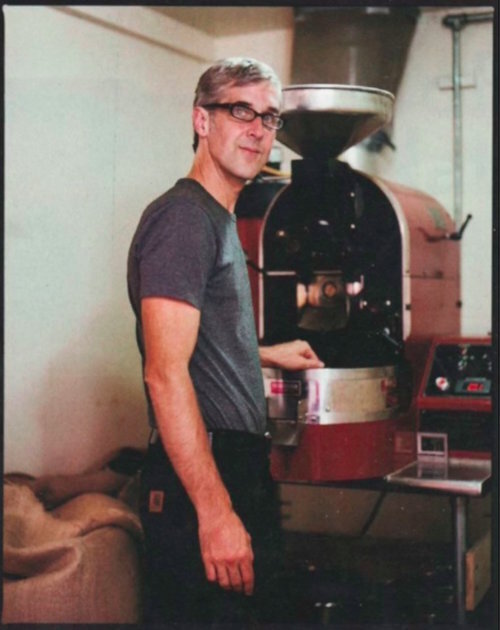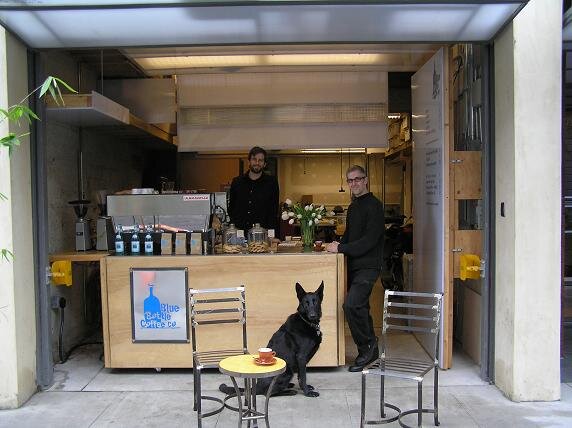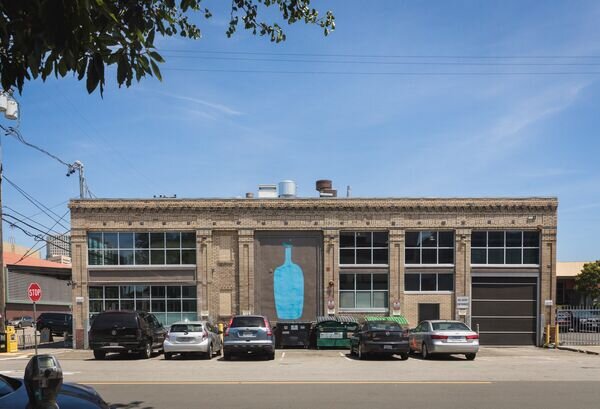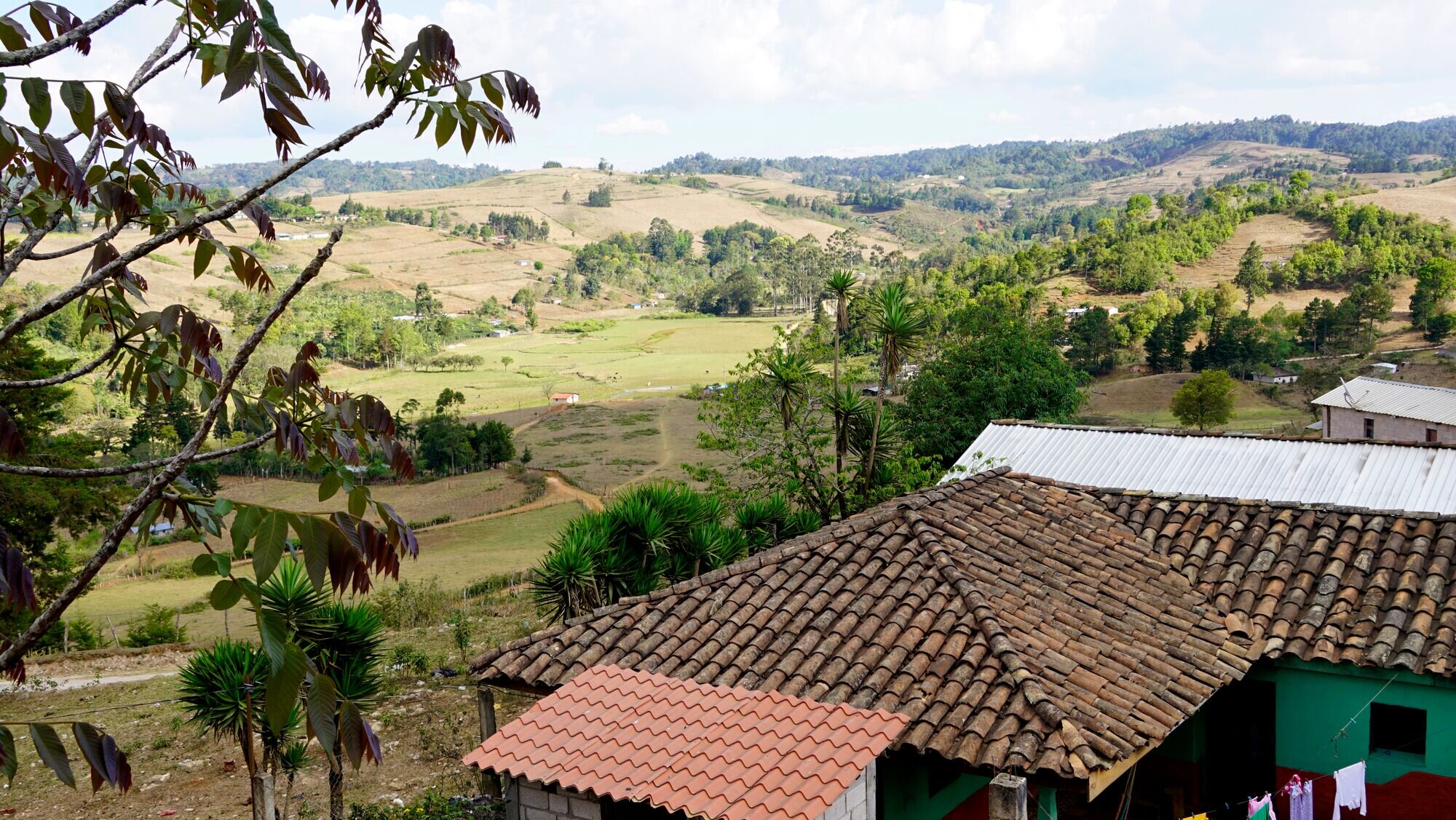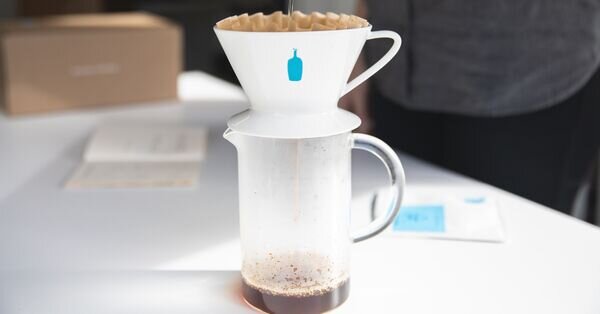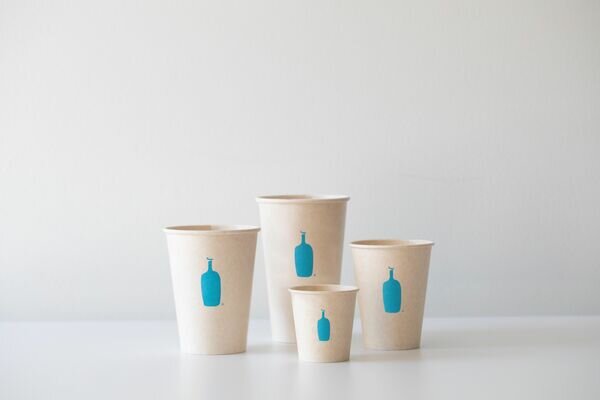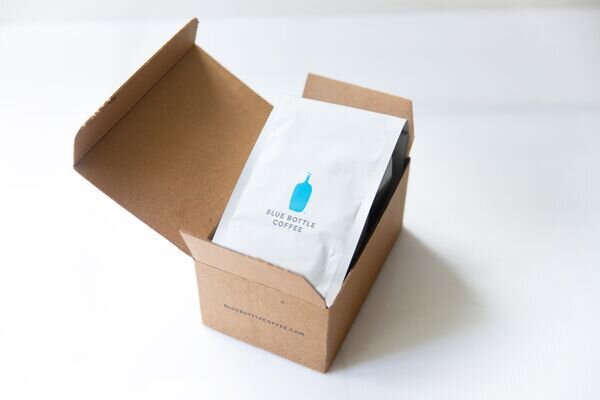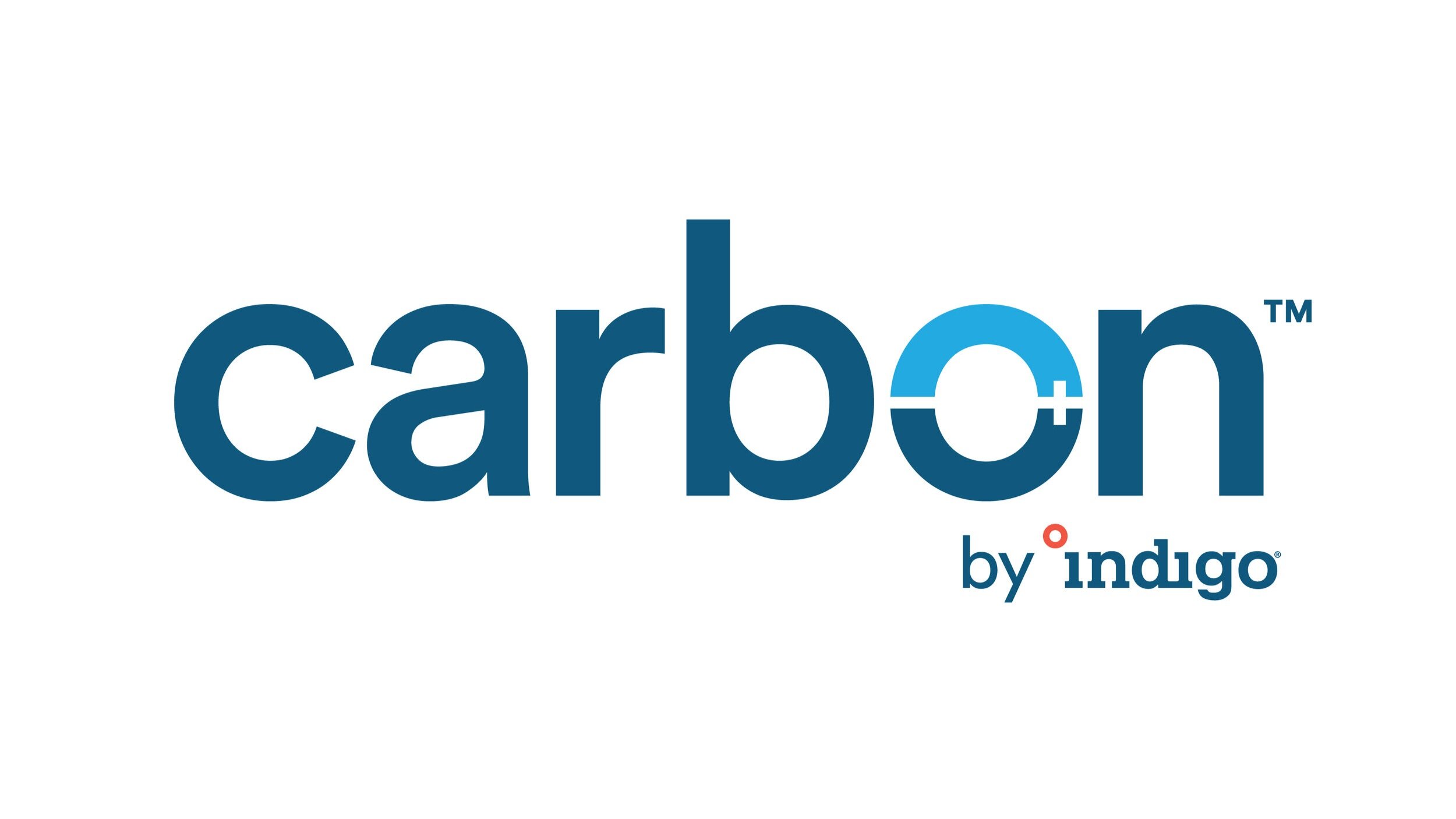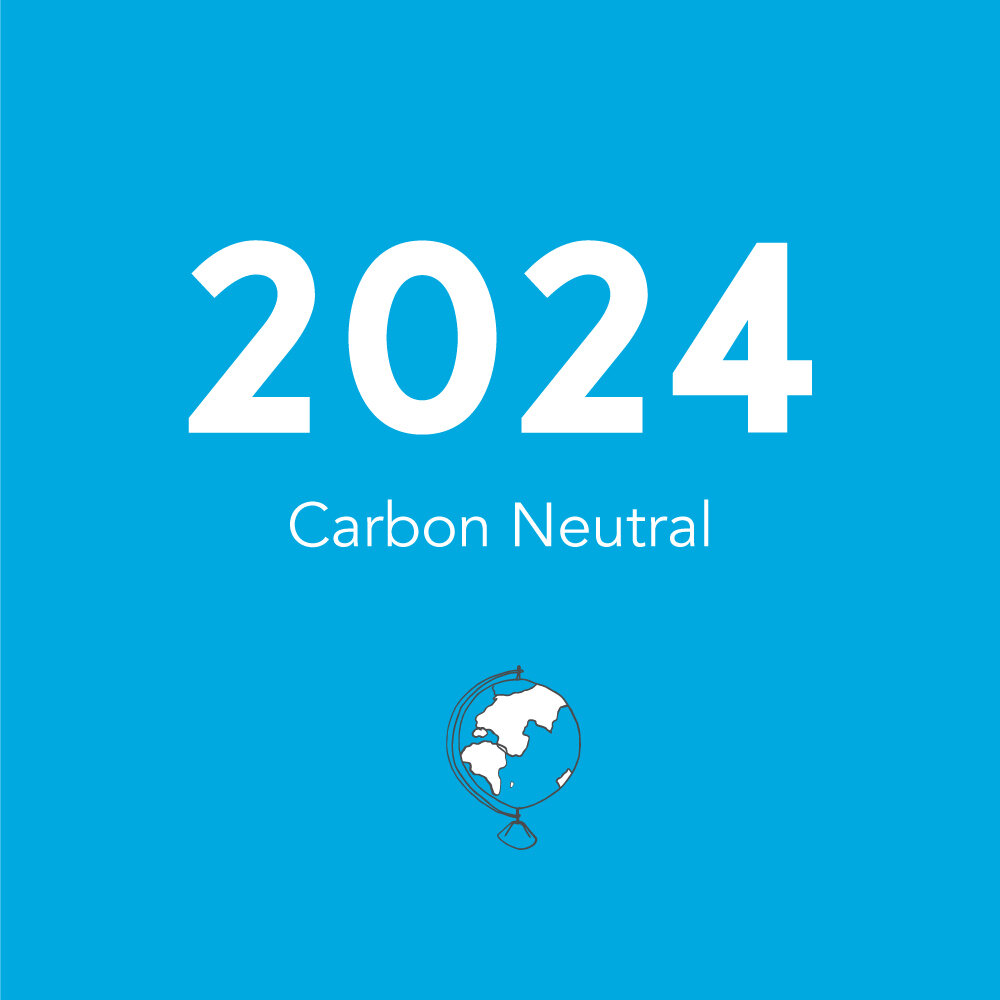Sustainability at Blue Bottle: A Timeline
Two decades of innovation
Our sustainability commitments have their roots in the first days of the company, when our founder James Freeman aimed to treat coffee the way local farmers had started to handle their fresh produce at San Francisco’s growing farmers markets: with obsessive care for quality and environmental health. Along with a focus on organic ingredients, James even enforced an informal ban on unnecessary single-use plastic containers.
2002
Blue Bottle Coffee is founded
Organic and plastic-averse from the start …
Inspired by San Francisco farmers markets, where he regularly shops, former clarinetist and coffee fanatic James Freeman sets out to treat coffee with the same farm-to-table care as a fresh tropical fruit, brewed right after roasting, from blends he makes with certified-organic beans. From his first espresso drinks, he serves only organic dairy, no extra charge.
In his commitment to avoid plastic and other petroleum-based products, James makes his first blends in stainless steel stockpots instead of plastic tubs, and sells them in Kraft paper bags.
“I wanted to treat sustainability as a constraint that could make our coffee perhaps even more delicious. That constraint was the skeleton I built the company around, and it built in a lot of creativity.”
2005
Reuse before single-use at our first brick-and-mortar
Our new Hayes Valley Kiosk, intentionally opting away from plastic vessels, features San Benedetto sparkling water in glass bottles, as well as pastries stored in Anchor Hocking glass jars and served in compostable paper bags.
2009
First trips to origin
While we still buy most of our green coffee through Bay Area specialty coffee importers such as Royal and Sweet Maria’s, we are able to send our first green coffee buyers to coffee farms like the farms of the La Voz cooperative, pictured here, in central Guatemala, to widen our commitments to direct trade.
First reusable deposit system
We start selling granola and yogurt in reusable glass mason jars that are returnable for a $1 deposit.
2010
Our Webster StREET roastery achieves CCOF organic certification
Though we’ve been buying organic coffee all along, with this certification of our Oakland roastery, for the first time, our coffees can now carry the USDA organic stamp on our bags.
2011
Frog Hollow closed-loop composting system
At our Ferry Building cafe, we start setting aside spent coffee grounds and filters from the rest of the compost to give to two regulars, Al and Rebecca Courchesne, the husband and wife behind the legendary Frog Hollow Farm in the San Joaquin Valley. Whenever possible we incorporate their stellar fruit into our pastries.
Farewell to these wood-pulp filters
Coffee filters 2.0
Concerned about forest preservation and energy conservation, we trade in our unbleached wood-pulp filters for kenaf filters, made from Hibiscus cannabinus, or kenaf, a fast-growing bush that has a high yield-per-acre relative to timber and requires less energy to process into paper.
Plant-based to-go cups
Blue Bottle becomes one of the first larger-scale businesses to switch from plastic-lined paper cups and plastic lids to plant-derived PLA-lined kraft paper cups with PLA lids. Though these cost more, James says, “I’m happy to do it because less plastic coming in means less plastic going out.”
2013
Second reusable deposit system
At our Mint and Heath cafes, we beta-test sourcing our milk through a local dairy farm with returnable glass jars; the experiment is phased out due to pricing and scalability.
Relationship coffees
With the widening travels and growth of our green coffee team, the quantity of our coffee bought through relationships at origin, such as with the Catracha community in Honduras, pictured here, reaches 95 percent.
2015
Certified-organic cold brew
Our New Orleans-Style Iced Coffee and other cold brew production shifts to a local brewery, Fort Point, which starts to operate under an organic certification.
2016
Blue Bottle Dripper + Coffee Filters 3.0
After years of R&D, we release our proprietary new Blue Bottle dripper and filters.
Dripper Made of thin porcelain and sized to a single-cup serving, the dripper is not only designed to eliminate excess material and energy use, its inlaid ridges radiate heat through the body to maintain an even brew temperature and achieve optimal extraction.
Filter Our new filters are unbleached and do not require pre-rinsing. In addition to its convenience factor, this significantly reduces water usage for the approximately 7,000 pour over coffees we serve each day.
2018
Cold brew compost
After moving cold brew production to our own Berkeley facility in 2017, we begin donating all our spent cold brew coffee grounds (up to 10 tons a week!) to Frog Hollow Farm in 2018.
2019
We say hello to . . .
. . . fiber straws. We first bid adieu to our iconic blue compostable bioplastic straws after learning that they do not break down as efficiently as fibrous material in industrial composting facilities. We source paper straws in the US, and in Asia we begin offering bamboo straws in 2020.
. . . Loring roasters. All roasting operations at our four roasteries—in West Sacramento, Brooklyn, Tokyo, and Seoul—are now using new California-made machines that burn 80 percent less gas than the beloved Probat machines we previously used. In West Sacramento alone, this reduces our carbon footprint by more than 125,000 pounds annually, or the equivalent of removing twelve passenger vehicles from the road per year.
. . . sugarcane cups. In the US, where we compost our coffee cups in most markets, we switch our clear, rigid bioplastic iced coffee cups to more easily compostable paper cups made from bagasse, a byproduct of sugarcane processing. The cups come with a thin, plant-based liner of PLA to maintain form.
. . . Nestlé’s Creating Shared Value Council. Our former executive chair Bryan Meehan is named one of the nine members of our parent company’s Creating Shared Value Council, which advises the development of Nestle’s long-term sustainability strategy.
2020
First renewable energy procurement
Five Japan cafes and our first Asia roastery begin purchasing renewable electricity for 100 percent of facility operations.
Kitasuna, our Tokyo roastery, commissary, and production site serving 27 cafes throughout Asia and all of Japan's e-commerce business
Sustainable coffee-sourcing audits
We collaborate with the nonprofit Enveritas to launch our first holistic assessments of sustainability at origin, examining the social, environmental, and economic factors shaping our coffee supply streams. From these reports we can identify opportunities for continuous improvement and set shared goals with producers.
US E-commerce shipping emissions addressed
After the novel coronavirus outbreak, we continue to reach guests at home. This growth in online orders sparks conversation around how the company puts its sustainability values into practice, leading us to compensate for the greenhouse gas emissions associated with our e-commerce business for orders shipped throughout the United States.
Regenerative agriculture
As an inaugural supporter of Carbon by Indigo, Blue Bottle is helping achieve long-term climate impact from the ground up. Through a commitment to purchase the first high-quality, registry-certified agricultural carbon credits generated at scale, Blue Bottle is directly supporting farmers’ efforts to adopt sustainable practices that remove and abate carbon from the atmosphere and contribute toward a more beneficial agricultural system.
2021
World Coffee Research
We become a sustaining member of World Coffee Research by joining the Checkoff Program, contributing a half-penny for every pound of coffee purchased through qualifying importers to the organization's research and development budget. World Coffee Research works to enhance coffee quality, productivity, and profitability for farmers.
Sustainability Committee
We launch our first employee committee to advance our sustainability agenda.
WE Commit to Carbon Neutrality by 2024
Blue Bottle commits to carbon neutrality by 2024. We begin reducing emissions in earnest with renewable energy purchases, the launch of oat milk-default pilot cafes, and the expansion of zero waste operations to all US cafes.
2023
Verified Responsibly Sourced Coffee Supply
Blue Bottle achieves Enveritas’s Responsibly Sourced mark for 90 percent of its purchases, with another 9 percent verified or certified as compliant with the Coffee Sustainability Reference Code.


